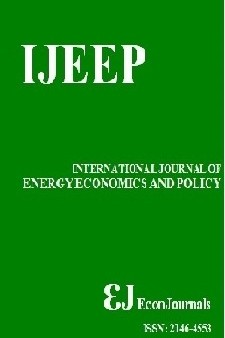The Effect of Stock, Government Policy, and Monopoly on Asymmetric Price Transmission in Thailand
The Effect of Stock, Government Policy, and Monopoly on Asymmetric Price Transmission in Thailand
- Başlangıç: 2011
- Yayıncı: İlhan ÖZTÜRK
Investigating Factors Affecting CO2 Emissions in Malaysian Road Transport Sector
Siti İndati MUSTAPA, Hussain Ali BEKHET
Ali ACARAVCI, Sinan ERDOGAN, Guray AKALIN
George Nikiforos BOTZORİS, Athanasios T. GALANİS, Vassilios A. PROFİLLİDİS, Nikolaos E. ELİOU
The Effect of Stock, Government Policy, and Monopoly on Asymmetric Price Transmission in Thailand
Prasarn PATANAKORN, Pongsarn PORNCHAİWİSETGUL
Aditya RACHMAN, Usman RİANSE, Mustarum MUSARUDDİN, Kurniati ORNAM
Olugbenga A. ONAFOWORA, Oluwole OWOYE
Measuring the Security of External Energy Supply and Energy Exports Demand in Central Asia
Mukhriz İzraf Azman AZİZ, Jauhari DAHALAN
Upward Sloping Demand for a Normal Good? Residential Electricity in Arkansas
